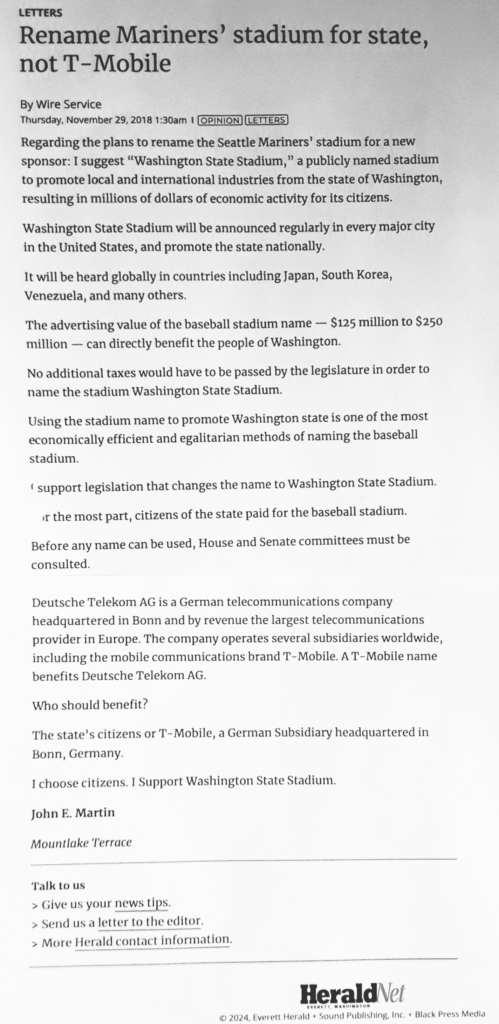Hey You Mariner You
The history of this song dates back to when I was about 3 years old. My Dad had a friend over. My Dad said, “throw me the ball.” I threw it as hard as a three year old could …..and hit his friend right in the face. I think his friend got a black eye or a cut or something, but he was injured. It is one of my earliest memories – – baseball.
In 1957, when I was seven years old and in grade school, we listened to the Milwaukee Braves and Hank Aaron play against the New York Yankees in the World Series. We grade schoolers took turns visiting the bathroom. On the way to the bathroom, we heard the janitor’s radio in the basement and checked on the World Series scores – – we went to the bathroom almost every inning to check the scores!! Milwaukee was in a baseball frenzy and the Milwaukee Braves won the 1957 World Series.
The love of baseball makes people totally irrational.
In the 1960’s, I walked to Milwaukee County Stadium, paid 50 cents, and watched the Milwaukee Braves games. I saw Warren Spahn pitch a no hitter. This was most significant because I once played baseball with his son in a city park and I could tell my friends, “I played against Spahn.”
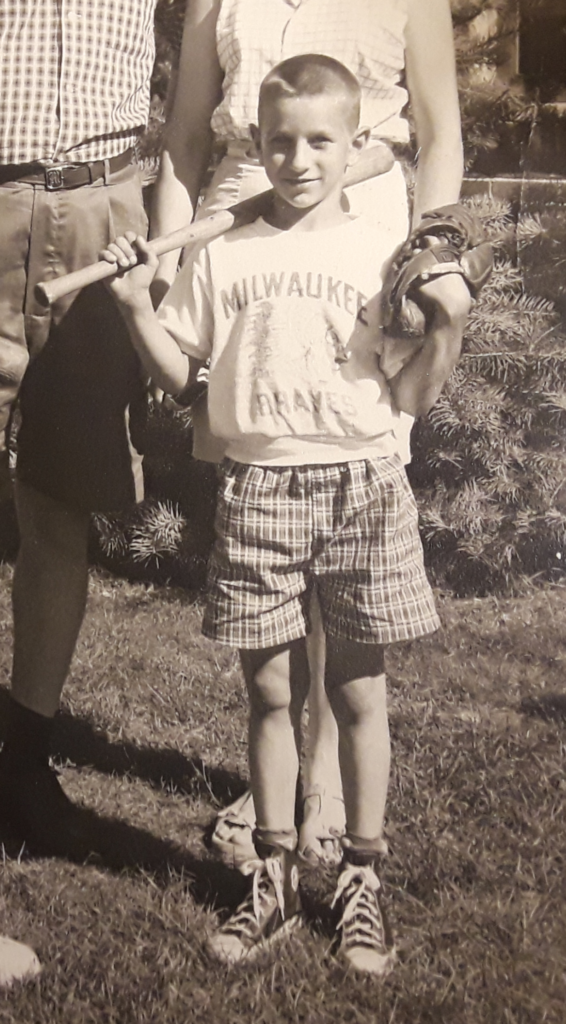
At that time, some of the major league baseball players rode the city bus to work; the players worked at Milwaukee County Stadium. When players were injured, they would sit behind home plate in the stands and chart pitches. I would sneak down in the stands and sit by the players when they were charting pitches. I remember sitting by Tommy Aaron. My biggest memory was when, after sitting by him for more than five straight games, Felipe Alou bought me a Coke!!!
Going to the Braves games was sort of like a childhood business. We’d get to the stadium as soon as the gates opened in the morning, rush to the cheapest 50 cent general admission seats, and start watching batting practice with our gloves in hand.
On a great day, you could get two or three Major League batting practice baseballs. One of my most vivid memories is when I caught a line drive game ball in the air. My catch was announced on the radio!
The major league pitchers used to hang around in the outfield during batting practice.
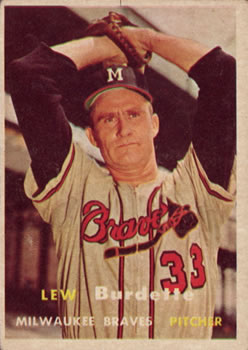
Another vivid memory is when Warren Spahn and Lew Burdette used to throw baseballs as high in the air as they could and the balls would come down in the midst of a few hundred kids with gloves. As the baseball landed, childhood mayhem broke out as we kids scrambled for the ball. Lew Burdette and Warren Spahn would take turns throwing the ball in the air and I think they got a real big kick out of it.
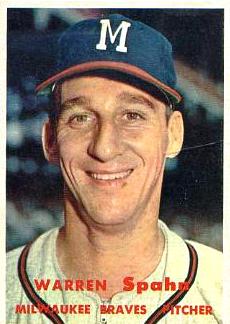
We would sell the batting practice balls for a dollar, covering our 50 cent admission fee, and use the balance for peanuts and something to drink. The year before the Braves moved to Atlanta, I went to probably 40 or 50 games that way. Baseball was in my blood.
One reason I moved to Seattle in the mid 70’s was because Seattle had a professional baseball team – the Mariners. The Seattle Mariners were absolutely terrible. It was 14 years before the Mariners had their first winning season in 1991. Worse than that, I couldn’t stand watching baseball inside — in the largest indoor concrete stadium in the world – – the Kingdome. It was called the Kingdome because it was paid for by King County residents.
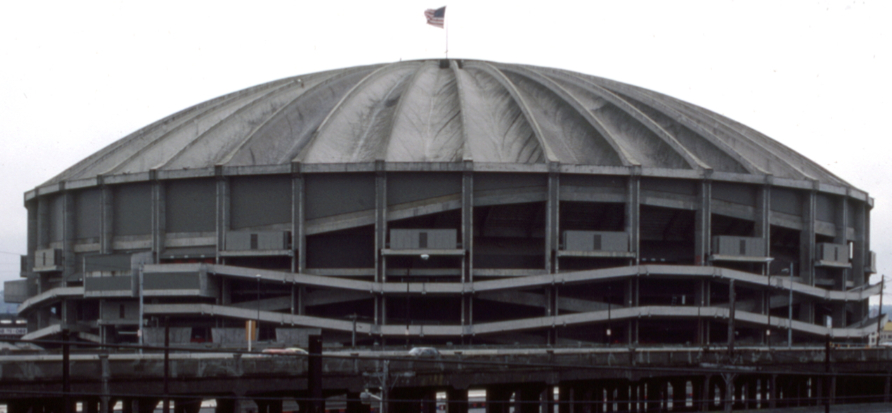
King County was originally named for William Rufus de Vane King, who was elected vice president with President Franklin Pierce in 1852. King developed a large cotton plantation based on slave labor, calling the property “Chestnut Hill”. It was reported that King and his relatives formed one of the Alabama’s largest slaveholding families, collectively owning as many as 500 people. King County was not originally named after Martin Luther King.
In 1986 King County passed a proclamation declaring Dr. King to be the county’s namesake. But it was not until Eddie Rye Jr., a local activist, and Larry Gossett, a county council person from 1994 to 2020, led an effort to officially change the name at the state legislature. During that period, Gossett and Rye received threatening calls and letters and vicious racist remarks were left on their answering services. After almost 20 years of effort, the name change officially passed the legislature in 2005.
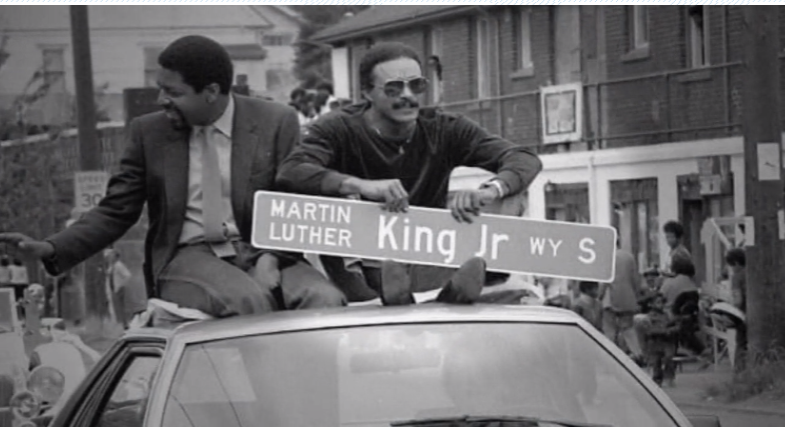
See council person Gossett and activist Rye in a video and article at:
The love of baseball makes people totally irrational.
In 1995, the Seattle Mariners were threatening to leave town unless they got a new stadium. The Mariners were 13 games out of first place in mid-August and pretty much, out of the pennant race. With a losing team, the Mariners were unable to hold the city hostage for a new stadium. In September 1995, a ballot measure authorizing public financing for a new stadium for the Mariners was voted down by King County voters.
Holding cities hostage is done by Major League Baseball teams in many cities across the nation. In September of 2023 seven Major League Baseball clubs were involved in funding efforts for new or renovated stadiums and that doesn’t count the Los Angeles Angels who pulled back after crime and controversy.
In 2023, the former mayor of Anaheim plead guilty to obstructing an FBI corruption investigation, wire fraud, and lying to authorities. He admitted expecting a $1 Million campaign contribution from the Los Angeles Angels.
In mid-August 1995, the Seattle Mariners started a winning streak. Mariner fans worked themselves into a wild baseball frenzy and I started selling souvenir towels in front of the Kingdome. I also saw it as an opportunity to promote my music by re-writing one of my baseball songs.
When I was in my 40’s, I played baseball on a men’s senior baseball team named the Orioles. One of the players, Waters, was a really good hitter. He had lots of women following him around all the time. Waters was kind of goofy when it came to making baseball decisions. For example, you should never steal third with two outs because if you’re tagged out, it takes a runner out of scoring position and ends the inning. The lyric read, ” Waters is on second, I think that he’s in love, he’s gonna steal third, everybody …. get your glove. Hey You Oriole You.” The team coach, Dave Rosen, was in the advertising business and actually did television advertisements for the Seattle Mariners.
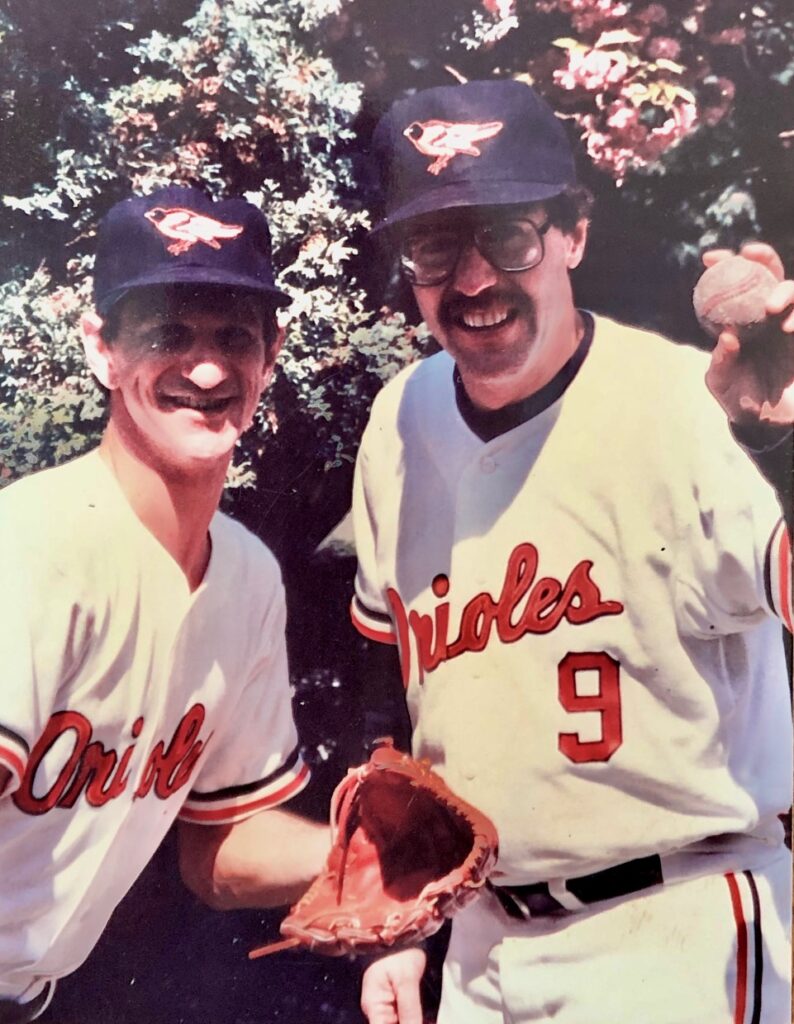
I asked Dave what the best recording studio in town was and he said Bad Animals Studio. In 1990, Seattle natives Ann and Nancy Wilson of the band Heart joined in ownership with Steve Lawson. A local radio personality, Steve expanded his studio to include music recording and re-named the company Bad Animals Studio.
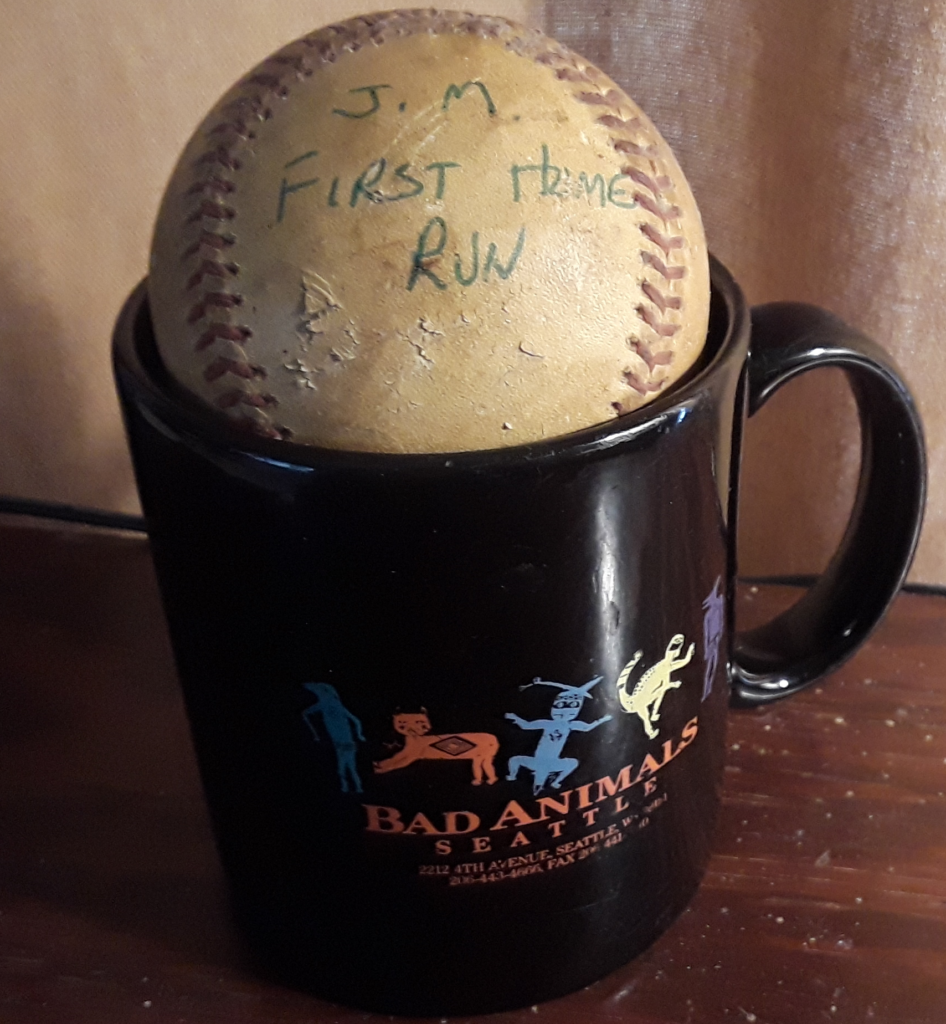
So I called them and, using Dave’s name as an introduction, they agreed to record me playing and singing Hey You Mariner You. The Mariners were playing the day the recording was made. There was baseball excitement in the studio air. Smurdy, the engineer, recorded this song and I brought it around to radio stations. My old boss Chuck Egner, who I sold play off tickets to at a marked up rate, told me he had an old friend, Patti Payne, at KIRO Radio. I called her and left a message which consisted of the song’s lyrics. She called me back and asked me to do an interview and bingo, Hey You Mariner You was put on KIRO Radio, the Mariners play by play station.
I walked around the Kingdome with a tape player, trying to get people to listen to my song. A street person said, “Hey, that song’s on the radio now,” and that’s when I first knew ‘Hey You Mariner You’ was getting some airtime.
I brought tapes of the song to other radio stations. I think they played it once or twice, even on one of the local Country Western stations. The entire city seemed to be baseball crazy. Things got a little weird when KJR Sports Radio 950 said they couldn’t play my song because it was the KIRO song. That sounded strange to me because it wasn’t KIRO’s song at all. It was my song.
Local sports media radio stations were in competition for advertising revenue. The interview I did with Patti Payne aired on KIRO over and over again. I don’t think ‘Hey You Mariner You’ was ever played on KJR and eventually, KJR started their own baseball song segment. But KIRO had the real thing – the play-by-play broadcast of the Mariners games!!
Professional sports creates media jobs – sports event announcers, sports writers, sports talk show hosts – and all the supporting staff – camera operators, sound engineers, equipment movers and the like.
Radio stations, local televisions and newspapers actively followed the stadium stories. The crux of the stories almost always favored building a new stadium. After all, professional sports increased viewership, readership, advertising revenue and profitability. Even anti-stadium sports talk shows failed to acknowledge their own media self interest in covering the story. The fact that professional sports creates jobs and profits in the media industries was not mentioned — not even in the new stadium Environmental Impact Statement.
Although I welcomed the airtime, KIRO used my interview and song, Hey You Mariner You, to increase audience size and profitability. KIRO never reported on my ideas about community involvement and non-public financing for the stadium.
The Seattle Mariners manipulated the intense local media bias and continued threatening to leave town unless they got a new stadium. On September 19, 1995, King County voters rejected a measure to finance the proposed stadium and John Ellis held a press conference to announce that the Mariners were up for sale.
The love of baseball makes people totally irrational.
Seattle Mariner fans continued a wild baseball frenzy, the Mariners kept winning, and elected officials started to get very very nervous. The Mariners won 25 of their last 36 games
On October 2nd, the Mariners culminated the streak with a victory in the American League West tie-breaker game over the California Angels in the Kingdome.
October 8th, the Mariners went on to defeat the New York Yankees in the Kingdome for the 1995 American League Division Series Title.
On October 12, 1995, the State of Washington Legislature, (called into a special session by Governor Mike Lowry) convened solely for “Baseball stadium financing.” The stadium financing, based largely on new taxes in King County, was passed and the session adjourned on October 14th.
Although King County voters rejected a measure to finance the proposed stadium, the King County Council capitulated 9 days later on October 23rd and approved the financing.
The Mariners chairman, John Ellis said the plan met the ballclub’s condition for keeping the team in Seattle, instead of following ownership’s plan to sell the team, presumably to out of town interests.
The Mariners had successfully held the City of Seattle, King County and the entire State of Washington hostage to the tune of one new stadium – – almost one-half billion dollars worth of ransom.
Ironic how it took about 14 years to change the name of the county from William Rufus de Vane King to Martin Luther King, but only about 14 days to authorize construction of a half billion dollar stadium for ransom.
Although it was reported that the Mariners contributed $126 million, it still seemed that the Mariners held the State, the County and the City hostage.
It seemed they . . . . bought the stadium . .. . for a song.
The Buy It For A Song Baseball Stadium Fund was a non profit corporation designed to secure funding from private sources to promote baseball.
The 1995 website states:
Baseball…the soul of baseball…the game …is played by young children in parks and on streets with sticks, bats, balls and leather and, anymore, on computer monitors as youngsters manipulate the actions of baseball icons. The soul of baseball survived through the last century and the Buy It For A Song Baseball Stadium Fund forecasts it will live on well through the turn of the next century and maybe forever. The Buy It For A Song Baseball Stadium Fund supports baseball. Baseball is a feeling.
With permission, the 1995 website hosted three songs: “Down at the Kingdome,” with harmonies and “refuse to lose” feelings highlighting the high energy Mariners 1995 season — “The Most Elegant Game,” packed with mature insights and perspectives from a childs point of view — “Hey You Mariner You,” recalling the damn Yankees and promoting the Mariners’ run for the World Series.
I encourage you to listen to them by clicking on a re-creation of the original Buy It For A Song Baseball Stadium Fund website below and, if you can, put in your two cents worth
Informal support for the organization came from a broad base of people ranging from factory assembly workers to small business owners and corporate executives. Some of them include: Chuck Egner, currently retired, and Scott Wooster of Pac Services, who provided a free web site and website services, Maria Cantwell, currently a US Senator from the State of Washington and then vice president at RealNetworks, who provided free sound software, Hunter McDonald, currently an attorney in the State of Washington, who provided free legal services, Belinda Pearson and John Russell, then Bank of America economists, who provided economic data and insights, plus food vendors, ticket hawkers, and shop owners in the Kingdome area.
The 1995 website indicated:
Professional baseball is a business and should be dealt with as such. The Buy It For A Song Baseball Stadium Fund favors constructing a professional baseball stadium in Seattle, Washington.
….Unlike government organizations such as the United States of America, State Governments, and Municipal Governments, Buy It For A Song will avoid debt liabilities and incur liabilities only to the extent that a positive net worth of the organization is maintained…
This approach, avoiding debt, was very different from the approach approved by the Washington State Legislature and adopted by Seattle Mariners which required public funds in the amount of $372 million and the sale of public bonds.
As a Buy It For a Song representative, I made Buy it for a Song comments to the Public Facilities District, June 17, 1996:
“…what we have here
are the poorest people paying proportionally more
to build luxury suites for the richest people,
who are paying proportionally less,
to sit in their luxury suites
and watch multi-millionaire baseball players
play baseball.”
Since taxpayers paid for the stadium, it seemed tax payers would at least be able to name the stadium or at least get the money for the stadium name.
The stadium is owned by a Public Facilities District (PFD), created in 1995 by the Washington State Legislature and the King County Council.
Buy it for a song proposed that the Public Facilities District (PFD) hold a public contest to name the stadium and submitted stadium names in over 10 languages.
But the Public Facilities District (PFD) sided with the Mariners and the Major League Baseball Monopoly. Eventually, two PFD board members resigned.
Not only did the Mariners hold King County hostage, they appropriated the stadium naming rights – sold the new stadium name to Safco Insurance – and then kept the money.
This is unlike taxpayers in Milwaukee County who named their stadium Milwaukee County Stadium and taxpayers in King County who named their stadium the Kingdome.
Now, baseball stadiums are paid for by taxpayers and named after corporations. What a rip off.
In October, 1995, The Seattle Mariners lost to the Cleveland Indians, and the 1995 Mariners season ended.
Seattle fans are still hoping and waiting for the Seattle Mariners to win a World Series, not too different than I was at age 7 – – hoping and waiting for the Milwaukee Braves to win the 1957 World Series.
In September, 2018, the Mariners asked the King County Council for an additional $180 million for capital projects at the stadium. King County Council opponents countered with a plan to give $25 million for Safeco Field and use the difference to build affordable housing. In a last-minute ‘compromise,’ the King County Council approved another $135 million in taxpayer funds for the Mariners ballpark – Safco Field.
The Mariners were in talks with new potential naming rights partners, presumably T-Mobile. This was an issue in the King County Council and PFD meetings in 2018.
Alternative names were proposed including Griffey Field.
I proposed that the stadium be named ‘Washington State Stadium’ to attract business to the State of Washington, stimulate the state’s economic activity and benefit taxpayers statewide. But again, the Mariners sold the name, this time to T-Mobile, and kept the money.
After I proposed the name ‘Washington State Stadium’at a PFD meeting, John Stanton came over and introduced himself to myself and my wife, Susan. Mostly he smiled alot and shook our hands.
John Stanton was the majority owner of the Seattle Mariners, Chairman and CEO of T-Mobile USA, and a billionaire wanna be. As far as billionaire Major League Baseball owners go, he was sort of the runt in a big pack of wolves. John Stanton finally made it to the billionaire club and his worth is currently estimated at $1.1 billion
I pointed out to him that T-mobile was not exactly a local firm as publicized by the bias local press, but instead T-mobile was a subsidiary of Deutsche Telekom, a German telecommunications company headquartered in Bonn and the largest telecommunications provider in Europe by revenue.
Deutsche Telekom’s current sporting venues include T-Mobile Arena, a multi-purpose arena in Las Vegas, T-Mobile Center, a multi-purpose arena in Kansas City, Missouri, and T-Mobile Park, a baseball stadium in Seattle, Washington.
I wondered how T-Mobile would help affordable housing and homelessness in Seattle. The Mariners said they were helping.
The Mariners received $87.5 million in naming rights. On December 18, 2018, I sent John Stanton an email and registered letter (see full letter below) asking him to donate the naming rights money to the Seattle Children’s Hospital to care for all children in the region. The letter continued:
“As chief counsel to the Mariners Mr. Rivera and I discussed, in the next 25 years, the value of the Mariners is projected to increase from $1.45 billion to between $3.25 and $8.3 billion dollars, an increase of between $1.8 and $6.8 billion dollars. I feel $3.5 million per year is very affordable for the Seattle Mariners.
… Mariner fans (would be happy if they) knew that $87.5 million from T-Mobile naming rights money was being donated to Seattle Childrens Hospital…
Sending T-Mobile naming rights money directly to a hospital would be precedent setting, not only for Major League Baseball, but for all of professional sports.”
Best Regards,
John E. Martin
I spoke with Superior Court Judge Terrence A. Carroll, a member of the PFD from 1997-2014, who wrote that any subsidies for the Mariners should require a more thorough vetting of their books.
Judge Carroll seemed kind of shocked that I had sent the Childrens Hospital donation letter to John Stanton and asked if I thought the Mariners would actually donate the money.
I said, “When pigs fly.”
John Stanton never answered.
Hey You Mariner You
The Mariners 2023 season ended with the Mariners missing the playoffs by a heart breaking one game. Pre-season odds for the Mariners winning the 2024 World Series were 20 to 1.
I placed a bet that the Mariners would win the 2024 World Series.
I lost and placed a bet that the Mariners would win the 2025 World Series.
The love of baseball makes people totally irrational.
We’re gonna win the World Series
Go Team Go!!
Hey You Mariner You
By Noj (John E Martin)
I’ve been to New York City, seen the pinstripe truth
But when they play us, they just embarrass Babe Ruth
Hey You Mariner You, Hey You Mariner You
Hey You Mariner Mariner, Oh You Mariner You
Well, they’re winnin’ in Cleveland, but we don’t care
’cause they won’t be winnin’ when we get there
Hey You Mariner You, Hey You Mariner You
Hey You Mariner Mariner, Oh You Mariner You
National League, we’ll see ya this Fall
Seattle is comin’ to play baseball
Hey You Mariner You, Hey You Mariner You
Hey You Mariner Mariner, Oh You Mariner You
Well, if you’re a Mariner you can sail
Across the waves and the water and the stadium tale
Wild Card, Division, The Pennant, You Know
We’re gonna win the World Series
Go Team Go!!
Hey You Mariner You, Hey You Mariner You
Hey You Mariner Mariner, Oh You Mariner You
Well, they’re winnin in Boston but we don’t care
’cause they won’t be winnin’ when we get there
Hey You Mariner You, Hey You Mariner You
Hey You Mariner Mariner, Oh You Mariner You
I’ve been to New York City, seen the pinstripe truth
But when they play us, they just embarrass Babe Ruth
Hey You Mariner You, Hey You Mariner You
Hey You Mariner Mariner, Oh You Mariner You
================================================
Letter sent to Mariners Chairman John Stanton on December 18, 2018
From: john martin
Sent: Tuesday, December 18, 2018 8:16 AM
To: Hale, Rebecca /SEA rhale@mariners.com; FanCare@Mariners.com FanCare@Mariners.com
Subject: Bruce Leven Endowed Fund
Bruce Leven Endowed Fund
Mr. John William Stanton
Chairman and Chief Executive Officer
The Baseball Club of Seattle, LP
1250 First Avenue South
Seattle, WA 98194-0100
206-346-4001
Dear Mr. Stanton,
Greetings to you during this Holiday Season.
I am proposing the Bruce Leven Endowed Fund as a new part of Mariner community involvement.
Seattle Children’s Hospital supports uncompensated care through the creation of the Bruce Leven Endowed Fund. This vital fund will help Seattle Children’s deliver on its founding promise to care for all children in the region, regardless of their family’s ability to pay.
In addition to helping Seattle Children’s continue to provide financial assistance to families in need, the endowment will support uncompensated care within pediatric cancer care, including the Strong Against Cancer philanthropic initiative. The endowment will also support uncompensated care within Seattle Children’s Odessa Brown Children’s Clinic (OBCC), which manages more than 40,000 patient visits each year. The clinic offers medical, dental and mental health services – especially to families in low-income communities. OBCC’s model for care is unique and addresses the social, economic and environmental roots of illness.
Seattle Children’s is the residual beneficiary of the estate of Bruce Leven and the bequest is expected to exceed $60 million.
During this holiday season, the Mariners could announce a matching naming rights donation of $60 million to the Bruce Leven Endowed Fund and naming rights donations to the Ken Griffey Family Endowment for Pediatric Cancer Research.
As chief counsel to the Mariners Mr. Rivera and I discussed, in the next 25 years, the value of the Mariners is projected to increase from 1.45 billion to between $3.25 and $8.3 billion dollars, an increase of between $1.8 and $6.8 billion dollars. I feel $4 to $10 million per year is very affordable for the Seattle Mariners.
As you know, the naming rights revenues from the St. Louis Cardinals Ballpark Busch Stadium goes into two separate
funds-one benefiting the state of Missouri and one benefiting the City of St. Louis.
The naming rights revenues from the Mariners Ballpark could go into two separate funds – one benefiting the Bruce Leven Endowed Fund and one benefiting the Ken Griffey Family Endowment – Griffey-T-Mobile Field – a great co-branding name for a stadium!
Honoring the legacy of Ken Griffey Jr. this way would be mutually beneficial to the Seattle Mariners, the Washington State
Public Facilities District, citizens of the State of Washington, baseball fans, and children.
There has been an outpouring of fan support for using Ken Griffey Jr. in the name of the stadium, some of which you have
received directly.
How many lives could the Mariners help save by donating $4 to $10 million dollars each year to Seattle Childrens Hospital?How many more people would work to provide medical services to families in low-income communities. How many more people would work in pediatric cancer research? How many happy fan smiles and memories would there be when Griffey-T-Mobile Field was announced?
Sending Griffey-T-Mobile naming rights money directly to a hospital would be precedent setting, not only for Major League
Baseball, but for all of professional sports.
The Mariners have an opportunity to show leadership in Major League Baseball, promote the game of baseball, and demonstrate
responsible corporate citizenship.
I hope you give this proposal further serious consideration during this Holiday Season, a wonderful time of the year for the Mariners to show their generousity to the community by making naming rights donations.
I hope you have a Happy Holiday season and I look forward to hearing from you.
Best Regards,
John E. Martin
Baseball Fan
====================================================
Letter to the Editor Everett Herald published on November 29, 2018
